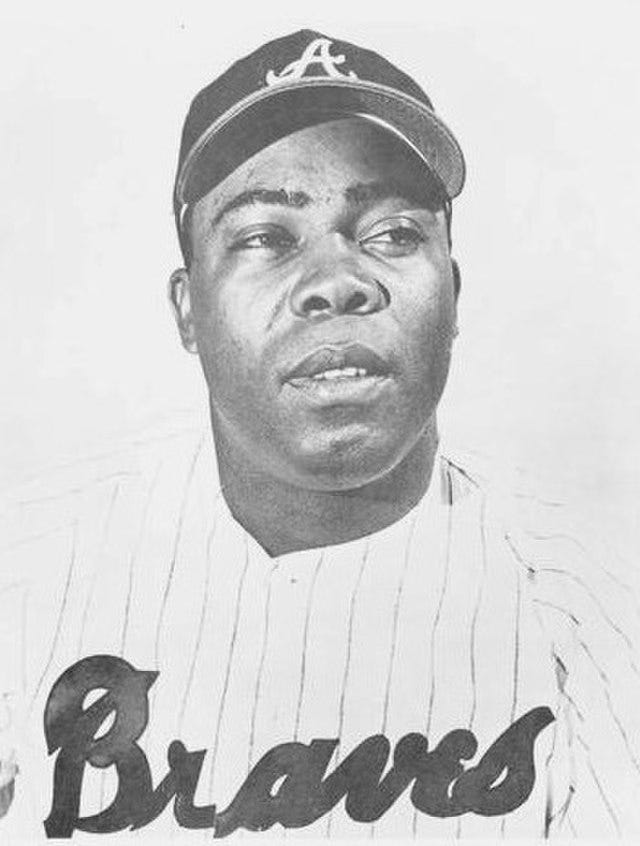When Bob Short Was Caught Short By a Fan
ALSO: HANK AARON'S YOUNGER BROTHER NEVER MADE IT BIG WITH BRAVES
Pregame Pepper
Did you know…
Vaughn Grissom, hitting .366 with a 1.044 OPS in 48 plate appearances for AAA Gwinnett, didn’t win Atlanta’s shortstop job this spring but is getting another shot now that veteran Orlando Arcia is sidelined with a microfracture of his wrist . . .
Apparently the Marlins knew what they were doing when they acquired Luis Arraez, the American League batting champion, from Minnesota — he hit for the first cycle in Marlins history earlier this week . . .
Just days after suffering the agony of losing budding young star Oneill Cruz (broken ankle) for four months, Pittsburgh became the first team to get home runs from Korean natives in the same game . . .
One night after tagging defending Cy Young Award winner Sandy Alcantara with nine earned runs, the Marlins defeated the Phillies handily . . .
An early candidate for this year’s American League Cy Young, Shohei Ohtani improved to 2-0 with a 0.47 ERA and 24 strikeouts in 19 innings (three starts) this year, his last before free agency, but says he’s unhappy with his control (12 walks) . . .
Zack Grienke may be a future Hall of Famer but he can’t buy a win with the Royals . . .
Erstwhile postseason hero Ian Anderson, on the roster of AAA Gwinnett in the Atlanta system, will have Tommy John surgery to relieve the stress on an ailing elbow that allegedly contributed to his struggles over the last two years.
Leading Off
Fan Carries Protest Straight to Team Owner
By Andrew Sharp
“Baseball Bill” Holdforth was a bartender and voracious beer drinker who also was a rabid Washington Senators’ fan and an usher at Robert F. Kennedy Stadium before the team moved to Texas after the 1971 season. He died of a heart attack at age 66 in 2017.
In 1978, Holdforth earned himself a place in Washington baseball history by determining that the duplicitous owner Robert Short should pay a price for moving the expansion Senators. Years before, Short had moved pro basketball’s Lakers from Minneapolis to Los Angeles, then sold the team. He sold the Rangers in 1974 for a substantially profit.
Holdforth had an encyclopedic knowledge of the Senators, which he gladly shared with anyone who asked. But his first newsworthy effort to pay Short back for what he had done came when Short attended a Rangers’ game in Baltimore in 1972. “Baseball Bill” and friends harassed Short by carrying a banner down to his box seat at Memorial Stadium. Bill reportedly knew Orioles’ ushers, so nobody tried to remove the protesters.
Somebody – not Holdforth – famously dumped a beer on Short’s head that night, an action that made national news. “I’d never waste beer like that,” he told the Washington Post in 2004. Six years after the 1972 incident, however, Holdforth performed his most meaningful act of revenge on Short.
The story of how “Baseball Bill” helped keep Short out of the U.S. Senate was most recently recounted in a February 4, 2023, Washington Post article by Frederic J. Frommer, author of You Gotta Have Heart, a history of Washington baseball.
After Sen. Hubert H. Humphrey of Minnesota died in office in January 1978, his wife Muriel was appointed to fill the seat until a special election could be held that November. Humphrey’s term had four years to run.
Short, who died in 1982, had long been involved in Minnesota politics, running unsuccessfully for Congress in 1946 and toying with a race for governor there in the late 1960s while he owned the Senators. He had also been a top fund-raiser for Humphrey’s 1968 presidential race against Richard Nixon. So he had the credentials to mount a run for the Democratic-Farm Labor Party nomination to fill Humphrey’s seat.
When Holdforth learned of Short’s campaign, he formed “Baseball Bill’s Committee to Keep Bob Short out of D.C.” He and his friends managed to raise $3,500, enough to buy a large ad in the Minneapolis Tribune. The ad ran the Sunday before the primary.
The ad’s big headline read: Don’t Be “SHORT” Changed. The text summarized how Short had lied to Washington fans before moving the expansion Senators to Texas, leaving D.C. without a baseball team. The ad also got in a dig at Calvin Griffith, who had moved the original Senators to Minnesota after the 1960 season.
Despite the ad, Short managed to win the primary and went on to face Republican David F. Durenberger in November. Durenberger was a moderate who hadn’t previously held public office. At that point, Minnesota hadn’t elected a Republican to the Senate in 20 years.
According to Frommer, Durenberger’s campaign called Holdforth’s committee to ask permission to reprint the ad and distribute it at Minnesota Vikings’ home games before the November election. “We made it clear we wanted to see Short lose,” Holdforth said later about gladly agreeing to the campaign’s request.
Durenberger defeated Short and served in the Senate until the mid-1990s. Frommer wrote that an appreciative Durenberger said after he took office that Holdforth “was just one of those guys that I had to go meet… He’s really a larger-than-life character.” Holdforth told Durenberger that he wasn’t much of a supporter of the Republican “but just wanted to keep Short out of Washington, D.C.”
His effort to defeat Short helped cement Baseball Bill’s legendary stature as a Senators’ fan. The Post interviewed him when the Expos’ move to D.C. was announced. Post columnist Dan Steinberg eulogized Holdforth in 2017.
“People say baseball’s boring,” Holdforth told the Post’s Tom Boswell in 1972. “That’s because they don’t get involved in the game. You have to think. With baseball, you get as much out as you put in.”
Andrew C. Sharp is a retired daily newspaper journalist and a SABR member who blogs about D.C. baseball at WashingtonBaseballHistory.com
Cleaning Up
Tommie Aaron (Hank’s Brother) Never Got a Fair Deal From the Braves
By Dan Schlossberg
Having the same surname as baseball’s best player doesn’t always help.
Tommie Aaron, Hank’s younger brother, was a great example.

By the time Tommie arrived from the minors in 1962, Hank was entrenched. He had already won an MVP award, two batting crowns, three Gold Gloves, and a lot more.
But the biggest problem Tommie faced was Joe Adcock, a lumbering slugger with a hammerlock on first base for the Braves.
At that time, Adcock held the single-game record of 18 total bases, thanks to a four-homer game, and was one of four Braves who just a year earlier hit consecutive home runs in the same game (along with Eddie Mathews, Hank Aaron, and Frank Thomas).
As a result, Tommie was a backup, used as Adcock’s understudy, a pinch-hitter, and an extra outfielder.
That rookie year, 1962, turned out to be the best of Tommie’s eight seasons for the Braves, both in Milwaukee and Atlanta.
He singled against future Hall of Famer Juan Marichal in his first at-bat, had three doubles in a game against three different pitchers for the St. Louis Cardinals, and hit a game-ending grand slam against Phillies closer Jack Baldschun.
Tommie and Henry also homered in the same game three times — and in the same inning once.
On July 12, 1962, the Aarons became the first brother tandem to connect in the same inning since Hall of Famers Paul and Lloyd Waner in 1938.
With the Braves down by three entering the ninth inning, Tommie was selected to pinch-hit with one out and the bases empty. He responded with a long home run to left-center field.
Leadoff man Roy McMillan followed with a single, knocking out St. Louis starter Larry Jackson. Closer Lindy McDaniel couldn’t keep the Cardinals in front.
Mack Jones singled and Eddie Mathews walked, setting the stage for Henry Aaron. Though hobbled by a sore ankle, he didn’t disappoint, hitting the ball over the Milwaukee County Stadium fence at almost the same spot his brother had done minutes earlier.
The only walkoff grand slam of his career, it was Hank’s third bases-loaded shot of that season (he finished with 16 in his career).
Although the Aaron brothers celebrated together that night, their joy was short-lived.
Tommie was not only a man without a position but a victim of numbers, never finding a regular spot in the lineup. He also battled weight problems.
Years later, he told UPI sports editor Milt Richman, “You couldn’t possibly compare Hank and me. We’re two different-style ballplayers. He is the complete player. He can do just about anything. I had to scuffle.”
Even though he hit .333 with a .423 on-base percentage that August, when Adcock was injured, Tommie crossed the finish line of the 1962 campaign with a .231 mark and eight homers.
Out of the majors at age 33, he became the first black manager in the southeast when the Braves appointed him their Double-A pilot in Savannah in 1973. He spent several years in the system, even managing future double-MVP Dale Murphy — then a catcher — at both Savannah and Triple-A Richmond.
Tommie Aaron died of leukemia in 1984 just after his 45th birthday.
Former AP sportswriter Dan Schlossberg of Fair Lawn, NJ is working on a 2004 biography of Hank Aaron. Reach him at ballauthor@gmail.com.
Timeless Trivia
“I had a good knuckleball. I thought it was moving quite a bit. I felt I could have gone two or three more innings.”
— Future Hall of Famer Phil Niekro after he was lifted by Braves manager Joe Torre with a 3-2, seventh-inning lead in Game 2 of the 1982 NLCS, which turned into a three-game St. Louis sweep
The 42-year-old Niekro had started the opener, which he led 1-0 in the fifth when the game was rained out . . .
Dale Murphy, Bob Horner, and Chris Chambliss went 4-for-32 in the ‘82 NLCS, the last for the Braves until their worst-to-first season of 1991 . . .
Atlanta was then in the NL West, where it was stranded from 1969-1994 . . .
The Braves finished second in both 1983, behind the Dodgers, and 1984, trailing San Diego, before impulsive owner Ted Turner axed Torre, prompting a plunge in the standings . . .
Niekro, released a year before the manager, needed 32 wins to reach 300 and got there on the last day of the 1985 season after producing consecutive 16-win seasons with the Yankees. That team later employed Torre with smashing success.
Know Your Editors
HERE’S THE PITCH is published daily except Sundays and holidays. Brian Harl [bchrom831@gmail.com] handles Monday and Tuesday editions, Elizabeth Muratore [nymfan97@gmail.com] does Wednesday and Thursday, and Dan Schlossberg [ballauthor@gmail.com] edits the weekend editions on Friday and Saturday. Readers are encouraged to contribute comments, articles, and letters to the editor. HTP reserves the right to edit for brevity, clarity, and good taste.



